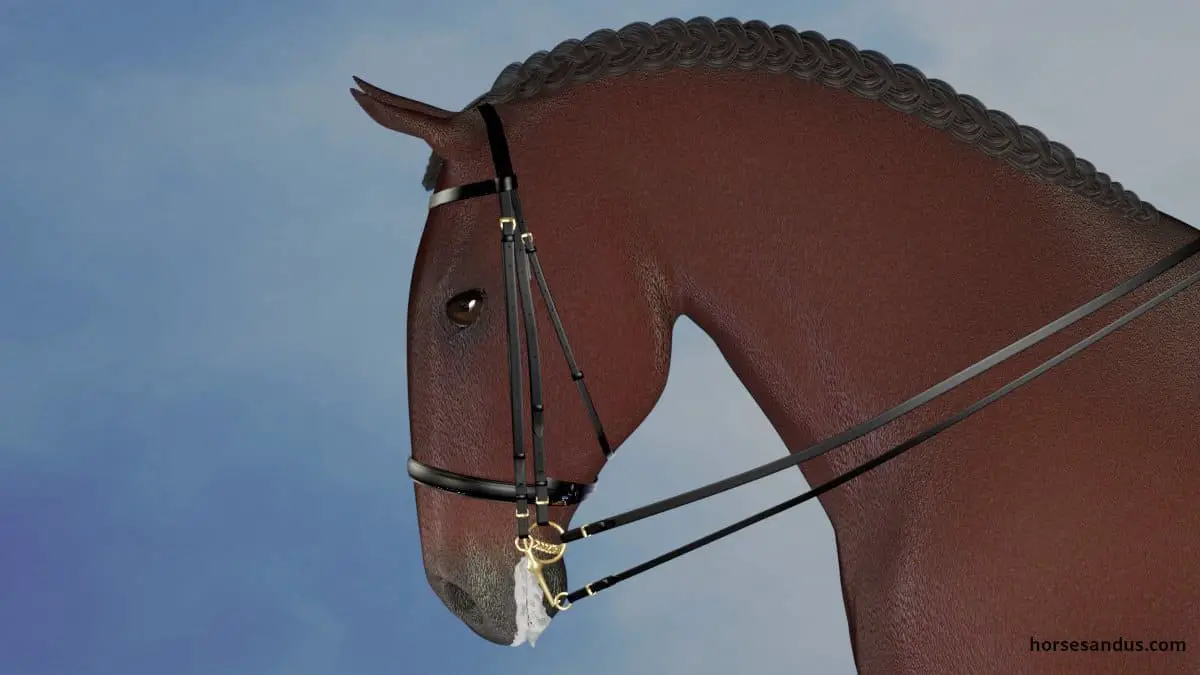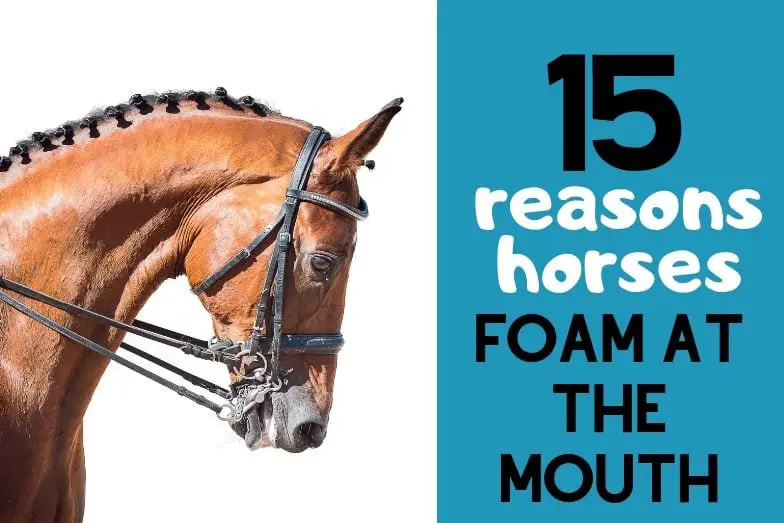Why Do Horses Foam at the Mouth? Horses foam at the mouth due to a variety of reasons, most commonly being caused by excessive salivation. The foaming is known as “frothing” and can be caused when horses are stressed or excited. This behavior can also occur when a horse has been ridden for an extended period of time, as well as after strenuous exercise.
Foaming may also be attributed to dietary deficiencies such as lack of salt in their feed, allergies or infections. In rare cases, it could indicate colic or other serious health conditions that require veterinary attention right away. Overall, foaming at the mouth is seen frequently in horses and though it’s not always cause for concern, seeking proper medical care is advised if it persists beyond normal levels.
Foaming at the mouth is a common behavior among horses, and is usually an indication that your horse is experiencing some type of stress. While it may appear that there isn’t any logical reason for this behavior, it can actually be caused by a few different factors. These include excitement or fear due to environmental stimuli such as loud noises or unfamiliar people, physical exertion from hard work or exercise, and digestive issues like ulcers or colic.
Foaming at the mouth should not be ignored and if you notice your horse exhibiting this behavior often then you should seek advice from your veterinarian on how to best manage the situation.
Why Does My Horse Foam at the Mouth When Riding
Riding a horse can cause them to foam at the mouth due to the combination of physical and mental exertion. When horses are being ridden, they must simultaneously concentrate on their rider’s commands while also expending energy from running or jumping. This causes increased salivation in some horses as a result of both excitement and stress.
Foaming is normal, and it should stop once your horse has cooled down after a ride. However, if you notice excessive foaming that does not dissipate with rest or when using certain tack, you may want to consult with your vet for further evaluation.

Credit: www.horsesandus.com
Why Would Horse Foam at the Mouth?
Horses can foam at the mouth for a variety of reasons, some more serious than others. Foaming may be caused by an allergic reaction to something in the environment or from a respiratory infection. In some cases, it is simply due to excitement or heavy exertion while working.
Foaming should always be taken seriously and monitored closely as it can indicate a range of health issues including dehydration, excessive stress on the animal’s body such as colic or oral pain and even poisoning. If your horse is foaming excessively and/or over an extended period of time you should consult with your veterinarian right away so that they can perform exams and tests to determine what is causing the problem and how best to treat it. With proper care, most cases of foaming are relatively benign but regardless you should never take chances when dealing with your horse’s health!
Is It Bad If a Horse Foams at the Mouth?
Foaming at the mouth is a very common symptom of horses and can be quite alarming for owners. In most cases, foam around the horse’s muzzle is not a sign of serious illness or injury, but it is important to identify what might be causing it so that appropriate action can be taken if needed. Foam at the mouth may appear as light froth or dense suds and could indicate anything from excessive saliva production caused by excitement or stress, to more severe problems such as colic or dental disease.
If your horse foams excessively and you cannot determine why, then contact your veterinarian right away so they can properly assess your horse’s condition.
Why Do Horses Drool And Foam?
Horses, like other mammals, drool and foam for a variety of reasons. While it is commonly thought that horses only drool when they are in pain or excited, this isn’t always the case. Horses may also drool for more mundane reasons such as being in hot weather or eating something salty.
Foaming at the mouth can be caused by anything from an allergic reaction to a bit being too tight. It’s important to pay attention to your horse’s behavior so you can identify any potential causes if your horse does start foaming or drooling unexpectedly. In some cases, excessive saliva production could indicate an underlying medical condition such as gastric ulcers or colic which should be addressed right away with veterinary care.
If you do notice that your horse is exhibiting these behaviors often, it’s best to get them checked out just in case there is something else going on that needs attention.
What Causes a Horse to Drool Excessively?
Excessive drooling, also known as ptyalism or hypersalivation, can be a sign of illness in horses. It is most commonly caused by an oral infection such as equine strangles, but other potential causes include dental problems, foreign body ingestion, gastric ulcers and certain medications. In some cases it may be due to pain associated with the mouth or teeth; if this is suspected then veterinary attention should be sought immediately to avoid further injury.
Additionally, stress and anxiety can cause horses to produce more saliva than normal; in this case ensuring that the horse has access to suitable grazing and companionship may help reduce its distress levels. Finally, some breeds of horse are prone to excessive salivation so if your animal falls into one of these categories it could simply be down to genetics rather than any underlying medical condition.
WHY DO HORSES FOAM AT THE MOUTH? – Competition Mastery TV Episode 17
Conclusion
In conclusion, it is clear that foaming at the mouth in horses is a common behavior and usually indicates some sort of stress or excitement. While it can be alarming to witness, as long as there are no other symptoms present like excessive sweating or increased heart rate, then it likely isn’t anything to worry about. However, if you notice any other concerning signs along with your horse’s foaming mouth, consult a veterinarian right away for proper diagnosis and treatment.
Janet G Kulick is an experienced horse rider, trainer, and owner of the informative horse blog, Horseray.com. Her engaging writing style and wealth of knowledge on horse care, riding, and training make her a trusted source for horse enthusiasts worldwide.






